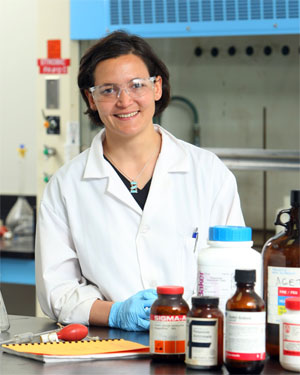 |
| Cheryl Saunders is a PhD student and TA with the Department of Chemistry. (Nick Pearce Photo) |
Dr. Bunsen Honeydew and his red-haired, cylinder-headed assistant Beaker should have talked to Cheryl Saunders.
The PhD student and teaching assistant in chemistry is the creator of the first comprehensive laboratory safety module for the Department of Chemistry. The program ensures all undergraduate chemistry students understand and are aware of the various hazards in the lab. 
‚ÄúPreviously the various lab manuals had different safety sections written by each specific lab instructor,‚ÄĚ says Ms. Saunders, who is completing her AVĺ„ņ÷≤Ņ Certificate in University Teaching and Learning. Students were expected to read the safety section and sign a document to declare that the section was read; however, much like the I-have-read-and-understood-the-terms-of-agreement box on a website, many students were either skimming through or not retaining the information.
Because the undergraduate labs have similar general safety concerns, Ms. Saunders believed all labs could have a common safety statement and the students‚Äô comprehension of this statement should be assessed. ‚ÄúI thought I could write this safety module for my certificate project, not only for me, but for the safety committee and the department,‚ÄĚ she says.
A member of the department‚Äôs safety committee, Ms. Saunders presented the idea to her colleagues and received their full support. ‚ÄúEveryone really helped out,‚ÄĚ she says. ‚ÄúI designed and wrote the module but the faculty, instructors and safety committee all gave me advice and read and edited the work.‚ÄĚ
The Safety Module is divided into personal safety, general lab techniques, chemical hazards, and safety equipment. A blank lab map corresponding to the lab being used by that course is also included, on which each student must identify the location of safety equipment.
After reading their laboratory manual and filling in their lab map, students complete six online quizzes to ensure they’ve retained the information. All first-year through third-year students in undergraduate laboratory classes are required to achieve 100 per cent on the quizzes to be permitted to work in a lab. They must repeat each quiz until it is passed. New randomized questions are presented in each new quiz attempt.
‚ÄúThe significant advancement here is that we ensure not only the student‚Äôs personal safety, but the safety of the whole class and everyone in the building,‚ÄĚ explains Dr. Neil Burford, chair of the Department of Chemistry. ‚ÄúIn chemistry it‚Äôs absolutely critical,‚ÄĚ he says of a department that sees 1,000 new undergrads each year.
To design the module, Ms. Saunders researched literature and best practices to see what was being done elsewhere and also relied on her personal experience as a teaching assistant. In only its first year, the module is getting good reviews. ‚ÄúAfter surveying the laboratory instructors and teaching assistants one comment that continually came back was that students were asking more questions about safety,‚ÄĚ she says.
Ms. Saunders has signed over the rights to the module to AVĺ„ņ÷≤Ņ, removing all restrictions for use within the Department of Chemistry and paving the way for its potential use in other departments.
Ms. Saunders, who plans to teach in the Department of Chemistry after completing her PhD in August, is one of three teaching assistants on campus to be awarded President‚Äôs Graduate Teaching Assistant Award. ‚ÄúThat‚Äôs why this is a successful product,‚ÄĚ says Dr. Burford. ‚ÄúThere are very few students who have the skills necessary to produce something like this.‚ÄĚ
